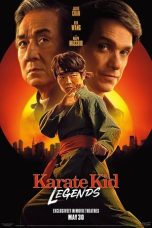City of God (2002) – A Gripping Chronicle of Crime and Survival
Introduction
“City of God,” directed by Fernando Meirelles and co-directed by Kátia Lund, is a Brazilian crime drama released in 2002. Based on the novel by Paulo Lins, the film offers a stark and unflinching portrayal of life in the favelas of Rio de Janeiro. Through the eyes of Rocket, an aspiring photographer, “City of God” chronicles the rise and fall of gangs and the pervasive violence that shapes the lives of its residents. This review examines the film’s narrative, performances, thematic depth, and where you can stream it in the United States.
Plot and Structure
The film’s narrative is structured as a series of interconnected stories, all centered around the titular “City of God” favela. The story spans from the 1960s to the 1980s, following Rocket’s (Alexandre Rodrigues) journey from a young boy surrounded by violence to a young man determined to escape the cycle of crime. Alongside Rocket’s story, the film delves into the lives of various gang leaders, particularly focusing on the rise of Li’l Zé (Leandro Firmino), a ruthless gangster whose reign of terror leaves a lasting impact on the community.
The film’s non-linear structure, punctuated by fast-paced editing and dynamic cinematography, keeps viewers engaged while providing a comprehensive look at the evolution of the favela and its inhabitants. Each character’s story adds depth to the overarching narrative, creating a multifaceted portrayal of life in one of Brazil’s most notorious neighborhoods.
Performance Highlights
The cast, largely composed of non-professional actors from similar backgrounds, delivers powerful and authentic performances. Alexandre Rodrigues as Rocket brings a mix of vulnerability and determination to his role, serving as a relatable guide through the chaos of the favela. His portrayal captures the struggle of a young man caught between the allure of crime and the desire for a better life.
Leandro Firmino’s portrayal of Li’l Zé is chilling and unforgettable. His performance embodies the terrifying transformation from a mischievous child to a feared and brutal gang leader. The supporting cast, including Phellipe Haagensen as Benny and Douglas Silva as Li’l Dice, also deliver standout performances, contributing to the film’s gritty realism.
Thematic Depth
“City of God” delves into themes of poverty, violence, and the loss of innocence. The film starkly depicts how systemic inequality and lack of opportunities drive individuals into lives of crime. It explores the impact of violence on a community and the cyclical nature of crime, where each generation seems doomed to repeat the mistakes of the past.
The film also highlights the power of resilience and the pursuit of dreams amidst adversity. Rocket’s passion for photography symbolizes hope and the possibility of escape, contrasting sharply with the lives of those who succumb to the harsh realities of their environment.
Cinematic Excellence
Fernando Meirelles and Kátia Lund’s direction is both visionary and impactful. The film’s visual style is characterized by its raw, documentary-like aesthetic, which adds to the sense of authenticity and immediacy. Cinematographer César Charlone’s use of handheld cameras and natural lighting captures the frenetic energy and tension of the favela, immersing viewers in its chaotic atmosphere.
The film’s editing, by Daniel Rezende, is particularly noteworthy. The rapid cuts and innovative transitions create a sense of urgency and momentum, driving the narrative forward while maintaining a cohesive and compelling storyline. The soundtrack, featuring a blend of Brazilian funk and samba, further enhances the film’s vibrant yet gritty ambiance.
Cultural Impact
“City of God” has had a significant impact on both Brazilian cinema and international audiences. It received critical acclaim and numerous awards, including four Academy Award nominations. The film brought global attention to the issues faced by residents of Brazil’s favelas, sparking discussions about poverty, violence, and social justice.
The success of “City of God” also paved the way for a new wave of Brazilian filmmakers and highlighted the potential of using non-professional actors to bring authenticity to cinematic storytelling.
Streaming and Availability
For those looking to experience “City of God,” several streaming options are available in the United States:
- Amazon Prime Video: The film can be rented or purchased on Amazon Prime Video.
- Apple TV: Available for rent or purchase on Apple TV.
- Google Play Movies & TV: The movie can be rented or bought on Google Play, accessible on various devices.
- Vudu: Available for rent or purchase on Vudu.
- YouTube Movies: Rent or buy the movie directly from YouTube, ensuring accessibility from any internet-enabled device.
- HBO Max: The film is available for streaming for subscribers of HBO Max.
Conclusion
“City of God” is a gripping and powerful film that offers an unflinching look at life in the favelas of Rio de Janeiro. With its dynamic narrative, standout performances, and visceral visual style, the film remains a landmark in modern cinema. It challenges viewers to confront the harsh realities of poverty and violence while celebrating the resilience of the human spirit. With various streaming options available, this seminal work of Brazilian cinema is easily accessible for new audiences and those looking to revisit its impactful storytelling. Dive into the world of “City of God” and witness a story that will stay with you long after the credits roll.

















